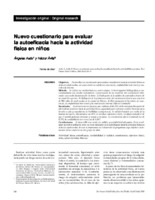Nuevo cuestionario para evaluar la autoeficacia hacia la actividad física en niños
Date
2009Metadata
Show full item recordAbstract
OBJETIVOS: Desarrollar un cuestionario para evaluar autoeficacia hacia la actividad física en niños de edad escolar, así como medir su validez de constructo, confiabilidad test-retest y consistencia interna. MÉTODO: Se utilizó un multimétodo en cuatro etapas: 1) Investigación bibliográfica y consecutivamente un estudio exploratorio. Construcción de los reactivos del cuestionario utilizando una escala dicotómica de 14 ítems. 2) Evaluación de la validez de contenido a través de un panel de expertos. 3) Aplicación de la primera versión del cuestionario final a una muestra de 900 niños de edad escolar de la ciudad de México. 4) Determinación de la validez de constructo, la confiabilidad test-retest y la consistencia interna (Alfa de Cronbach). RESULTADOS: Se obtuvieron tres factores que explican el 64,15 por ciento de la varianza: búsqueda de alternativas positivas hacia la actividad física, capacidad para enfrentar posibles barreras para llevarla a cabo y expectativas de habilidad o competencia. Se validó el modelo por medio de la bondad del ajuste, obteniéndose un 65 por ciento de residuos inferiores a 0,05, resultado indicativo de que el modelo factorial estimado se ajusta a los datos. La consistencia alfa de Cronbach fue de 0,733, la confiabilidad test-retest fue de 0,867. CONCLUSIONES: Se desarrolló una escala con validez y confiabilidad adecuadas. Estos resultados permiten utilizarla como un buen indicador de la autoeficacia hacia la actividad física en niños de edad escolar, lo cual es importante en el desarrollo de programas cuyo objetivo sea fomentar dicha conducta en este grupo de edad.(AU) OBJECTIVES: To design a questionnaire for assessment of self-efficacy toward physical activity in school children, as well as to measure its construct validity, test-retest reliability, and internal consistency. METHODS: A four-stage multimethod approach was used: (1) bibliographic research followed by exploratory study and the formulation of questions and responses based on a dichotomous scale of 14 items; (2) validation of the content by a panel of experts; (3) application of the preliminary version of the questionnaire to a sample of 900 school-aged children in Mexico City; and (4) determination of the construct validity, test-retest reliability, and internal consistency (Cronbach's alpha). RESULTS: Three factors were identified that explain 64.15 percent of the variance: the search for positive alternatives to physical activity, ability to deal with possible barriers to exercising, and expectations of skill or competence. The model was validated using the goodness of fit, and the result of 65 percent less than 0.05 indicated that the estimated factor model fit the data. Cronbach's consistency alpha was 0.733; test-retest reliability was 0.867. CONCLUSIONS: The scale designed has adequate reliability and validity. These results are a good indicator of self-efficacy toward physical activity in school children, which is important when developing programs intended to promote such behavior in this age group.(AU)
Subject
URI
http://www.scielosp.org/scielo.php?script=sci_arttext&pid=S1020-49892009001000006https://iris.paho.org/handle/10665.2/9763
Citation
Aedo, Ángeles,Ávila, Héctor (2009) Nuevo cuestionario para evaluar la autoeficacia hacia la actividad física en niños. Rev Panam Salud Publica;26(4) 324-329,oct. 2009. Retrieved from http://www.scielosp.org/scielo.php?script=sci_arttext&pid=S1020-49892009001000006
Collections
Related items
Showing items related by title, author, creator and subject.
-
Rech, Cassiano Ricardo; Sarabia, Tais Taiana; Fermino, Rogério César; Hallal, Pedro Curi; Reis, Rodrigo Siqueira (2011)
-
Reyes, H. Luz McNaughton; Padilla Zuniga, Karen; Billings, Deborah L.; Blandon, Marta Maria (2013)
-
González Ramírez, Mónica Teresa; Landero Hernández, René (2008)




